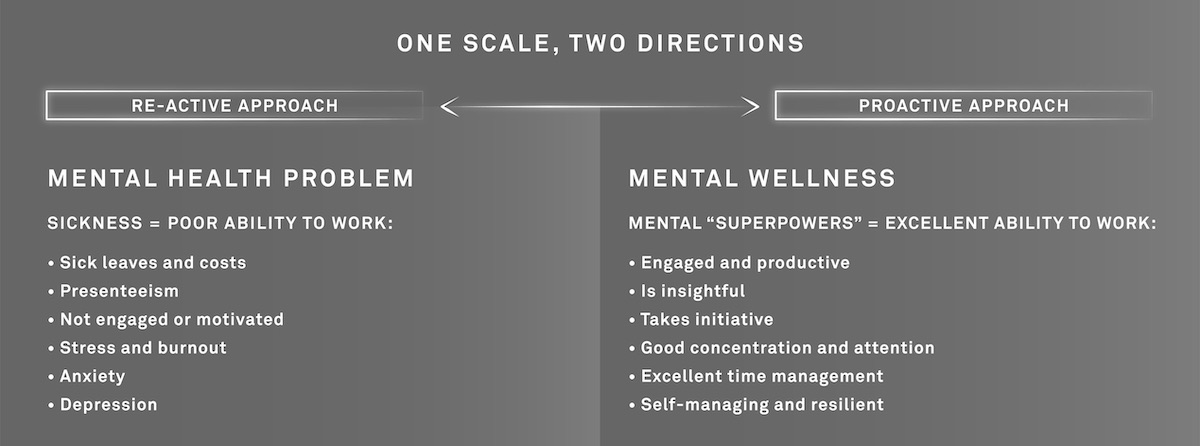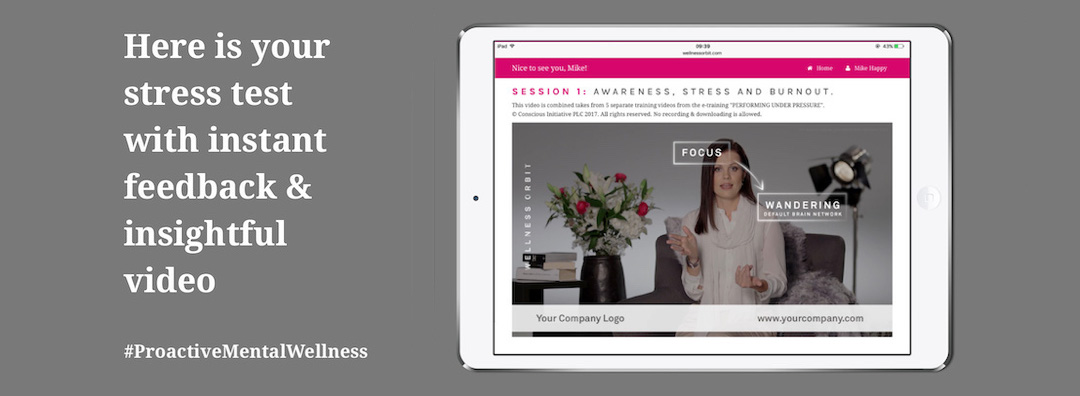Why does setting wellness goals matters?
While workplaces and businesses set clear business goals, wellness is often ignored as a fundamentally important goal. Wellness realistically is something that intentionally sets the workplace culture. Only when people have fit minds and bodies can they properly focus on your business goals.
The word "only" in the previous sentence is intentional as it represents the truth.
A fit mind has great self-leadership skills and hence is capable of leading others and knows what needs to focus upon at any given moment to achieve your actual (long-term or business) goals.
More than that, setting individual mental wellness goals and obtaining proper goals for securing mind health for every person can allow your team to thrive. When there is mental wealth, actual wealth can be created and good personal relations follow.
Stress, burnout and other mental health issues reduce productivity
We have explained in our previous blogs that a lack of mental wellness leads to a lack of productivity.
The proactive mental wellness approach is one of the most sensible investments. According to Deloitte, such an investment makes tenfold returns.
Most of this tenfold ROI arrives from improved productivity and the removal of presenteeism. Let's repeat, the reduction of work-related stress in the early stages prevents not only burnout but also many physical health diseases, like cardiovascular problems, tensions in the body, etc.
Investment into mental wellbeing thus makes perfect business sense.
Setting your mental wellness goals
The question is, have you and your team set clear mental wellness goals?
Let's bring an analogy here. Most of the mental health approach at work is either a short time activity or campaign based. During a global mental health day, we shortly discuss the problems and then forget the topic. How would this sound in the case of physical health?
What if we talked about the importance of physical health only once a year? Or focused on keeping our body well just once a year? It sounds absurd, doesn't it?
Mental wellness should get the attention it deserves as good mind health is the fundamental base for good work results.

A healthy mind works well
While normal mental health should equal mental wellness, we often look at mental health only when problems appear.
In the case of physical health, we go to the gym or SPA and we do small activities to keep it well. We go there while well, to stay well!
That is why we push the mental wellness revolution.
Neglecting (y)our mind health equals accepting business loss. It equals a toxic workplace and bad workplace culture. A lot of bullying and bad relations get started because of our inner reactivity.
When your mind is reactive, it is open to stress, burnout, anxiousness and this all can develop into depression, anxiety, and other mental health issues.
When an average mind meets a stressful event, it will suffer.
We can again look at the analogy with physical health. A body that is trained and well, can put up with physical tensions and challenges and even in the tough situations gets some scratches but doesn't break or get ill.
A mind and trained mind can meet challenges and even deal with traumatic events. An untrained mind easily suffers post-traumatic stress disorder (PTSD) as a result of such a sudden event. PTSD is a mental health condition that is triggered by some terrifying event – either experiencing it or witnessing it.
When you don't are unaware of your inner triggers, you always will get triggered.
Read that again. Only when you remove your triggers and replace those with aware responses will you have inner freedom and inner calmness.
What if you possess good mind health and excellent intrapersonal skills?
Then any difficult event would be easier to deal with. You notice your reaction and no longer go along with it and no can choose an aware response instead. You don't suffer from the triggered reaction any longer. Meeting such an event doesn't need to become pleasant, but at least it will no longer be traumatic for your mind.
Intrapersonal skills as the key to mental wellness
A calm-minded person with excellent intrapersonal skills can deal with any challenge.
Stress is always caused by inner reactivity.
Stressors are out there, but stress is your reaction. It is your automatic (subconscious) inner reaction.
Let's again bring an analogy with the physical body. When your body is trained, and you notice what is going on, then after spotting a danger, you can deal with it. You either step away from danger or meet the challenge wisely (including hitting back when self-defense is needed). You can take leave or take flight without getting out of breath.
A similar thing works with our minds. When your mind has natural calmness and possesses excellent intrapersonal skills, you notice the danger and trigger(s) but have inner tools to observe, meet the challenge wisely (by responding with awareness) and thus avoid personal trauma.
On both physical and mental levels, it comes down to having practical skills. Skills that you have trained in your body and mind. Without such training, life throws you a hardball.
However, the same intrapersonal skills that keep your mind well are also productivity and engagement tools for you and your team.
A fit mind cares, focuses, and can access creativity at will. Just as a fit body can take on physical action without suffering from pain that is pound to come to untrained muscles after heavier action.

When to start with the prevention of mental health issues?
Stress, burnout, anxiety and even depression, and many other mental health issues are fully preventable. However, prevention should start when people are well.
You make a business plan when you want to see improved results. You don't wait until you come to the edge of bankruptcy to start with a business plan and setting of actionable goals. It would be extremely stupid to lead a business this way. However, that is how we lead our mental health. We break it first and then we set goals to get it back. That is the harsh reality behind poor mental health statistics that have got worse and worse year after year.
When would it be enough?
9 out of 10 persons are already stressed.
Do we need to wait for 99 out of 100? 100 out of 100?
Who will guide us when everyone is unwell?
Why do most workplaces accept low employee engagement levels and huge mental health losses? Probably it is just ignorance and lack of awareness of how great and profitable are mental wellness investments.
Conclusions
Setting business goals should inevitably include setting mental wellness goals. It makes an excellent business case as fit minds work and live well. A fit mind naturally assumes personal responsibility and is aware of how to integrate personal life and work into a holistic one.
A fit mind is aware of its limits, spots dangers, and dares to tell the truth and face challenges. A fit mid can thrive. And a business that consists of fit minds equipped with excellent awareness-based intrapersonal skills can be at least 3 times more productive. That is, compared to a workplace where mental health is ignored or approached only reactively after mental health and business problems become too big to ignore.
Mental wellness adequately equips people with calm minds and inner tools that graciously allow them to focus when needed. A fit mind also allows them to naturally spend quality time with their loved ones or genuinely enjoy a holiday.
A fit mind promptly takes personal responsibility and responsible people make up sustainable workplaces. In such workplaces, stress levels are low and workplace culture thrives. Also, in such workplaces, people care about themselves, their colleagues and their customers.
A business that genuinely cares about its customers thrives.
This blog post is written by Kaur Lass



